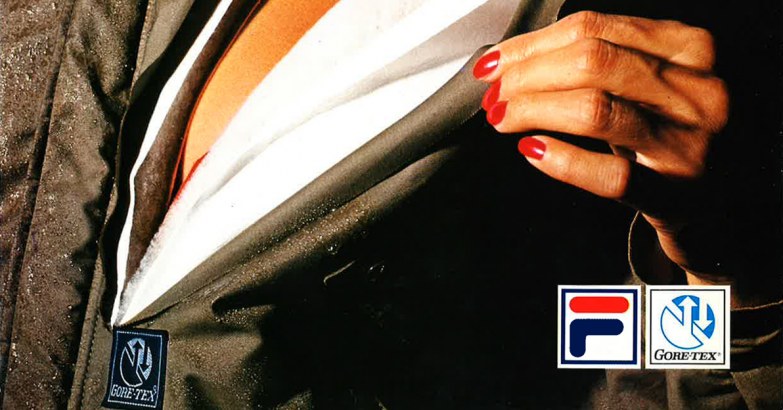LABELS: GORE-TEX
On the cover of a 1980 FILA catalogue, a model exhibits the filling of a dark grey jacket. As written on the pages inside, such material is called GORE-TEX and is presented as ‘an innovation for several uses, able to emphasize brand new solutions’. The text is specifically related to thermal and meteorological insulation features: but what is GORE-TEX?
In 1959 Genevieve and Bill Gore found a factory in the basement of their house in Newark, Delaware. Bill had quitted to work on a new project, following his studies on syntetic polymer PTFE, that was supposed to have a great potential. Ten years later, in 1969, his son Robert made an even more crucial discovery: by expanding PTFE he obtained Expanded PTFE, a porous material that was extremely tough and open to several possibilities. The GORE-TEX membrane contains 1,4 billions of pores per centimeter square: each of them is 20,000 times smaller than a water drop. Such characteristic makes the membrane waterproof, avoiding the passage of rain and snow. But it’s not over, because the other GORE-TEX remarkable feature is the combination of breathable and windproof properties. Whether it’s about cycling downhill on a mountain bike or a fast run, the freezing effect of wind is shielded all the time.
Patented on April 27, 1976, GORE-TEX yielded Robert and Wilbert Gore the introduction to the National Inventors Hall of Fame in 2006: taking advantage on its natural receptiveness to whatever’s avant-garde, FILA started to launch items made with the same material at the beginning of the Eighties. They were a successful, proud fusion of natural and synthetic fibers, a personal habitat in which every single human being was able to find the perfect conditions to live nature in the best way, starting from the mountain dimension. Yes, because the very first remarkable FILA pieces in GORE-TEX were filled jackets: constantly marked by water drops on catalogs, they were the proof that their interior parts were a safe shelter, an architecture guaranteeing the best conditions to conciliate the body and the landscape as well. Down the hills, the same material marked the brand’s sailing collections, enriching the imaginary of the Biellese company. In the photo shootings water splashes slide on fabrics in a harmonic way, shaping the silhouette of a modern, brave being, who cannot renounce style even in presence of harsh weather conditions.
Leave a Reply


